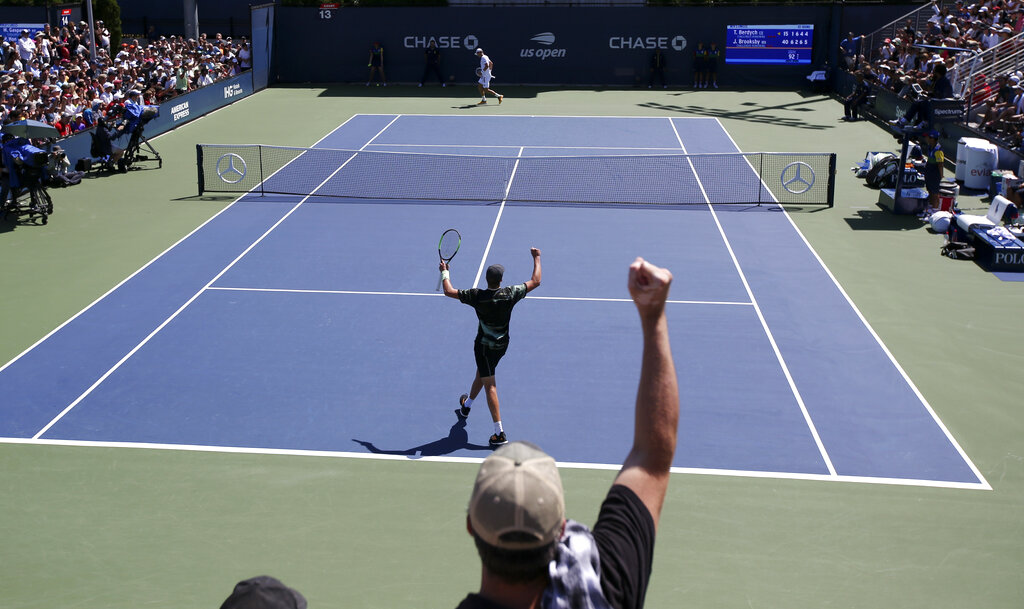
Jenson Brooksby, of the United States, foreground, reacts after defeating Tomas Berdych, of the Czech Republic, during the first round of the US Open tennis tournament Monday, Aug. 26, 2019, in New York. (AP Photo/Michael)
NEW YORK — Jenson Brooksby’s only guaranteed destination now is the second round of the U.S. Open.
College tennis may no longer be in the plans.
“It’s up in the air,” Brooksby said.
So is Tomas Berdych’s future.
The 18-year-old Brooksby earned his first Grand Slam win Monday with a 6-1, 2-6, 6-4, 6-4 victory over Berdych, who said he is “very close” to considering retirement after an injury-plagued season.
“That’s very frustrating. When you do the whole preparation, everything’s fine, goes well and then you get on court and basically there’s no way I can compete with the guys in this shape,” Berdych said.
He couldn’t do much over the final two sets against Brooksby, a Californian who was set to play at Baylor University after the year’s final major tournament.
But he was reconsidering even before he went through qualifying to reach the main draw, and then knocked off the 2010 Wimbledon finalist and 2012 U.S. Open semifinalist.
“I still thought there was a chance I don’t go,” Brooksby said. “But the more I win here, obviously the more likely it could go in the other direction.”
He looked ready for the pros while confidently recovering after the second set in front of a crowd that loudly backed him. Brooksby lost in the first round last year as a wild card but felt better about his chances this year after getting higher-level tournament experience.
An even younger American came oh-so-close to pulling off another surprise later Monday, but 16-year-old Zachary Svajda of California couldn’t quite hold on after building a two-set lead against 37-year-old Paolo Lorenzi of Italy, eventually succumbing 3-6, 6-7 (5), 6-4, 7-6 (4), 6-2.
The age gap of 21 years was the largest between male opponents at a Grand Slam tournament since 1978.
Svajda, who earned his berth in New York by winning the U.S. 18s national championship, was the youngest man in the main draw at Flushing Meadows since Donald Young also was 16 in 2005.
Players are guaranteed $100,000 for reaching the second round of singles play at the U.S. Open, though Brooksby would have to give up his amateur future if he takes it. That makes his decision even more difficult.
“Yeah, it’s definitely financial because, like, I would get four years of free college if I went just for one semester, compared to just the money I earn here,” he said. “So got to figure that all out.”
Berdych has his own thinking to do, though his body may already be giving him the answers.
Back and left hip injuries forced him to miss four months before Wimbledon and another month after before he came back for the U.S. Open with limited preparation. There wasn’t much power in the shots of a player who was No. 4 in the world only four-plus years ago, with some second serves coming in the mid-80 mph range.
“Today I felt terrible on the court, to be honest,” Berdych said.
There have been too many days like that as he prepares to turn 34 next month. He fell out of the top 100 earlier this year for the first time since Jan. 26, 2004 — seven months before beating Roger Federer in the Olympics — and perhaps soon may be out of tennis entirely.
“I mean, this was my third try that I tried and really I cannot find much the right solution that can get through it,” he said. “Also, I’m not 24 anymore.”

